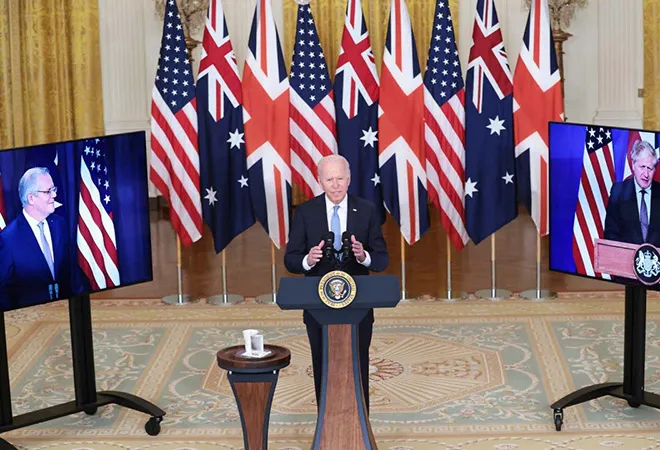
Washington has hosted several summits in the past, but none like the one held on the 24th of September; an inaugural first-ever in-person QUAD meeting with all the four heads of the QUAD governments, their respective foreign ministers, and several policy wonks in a single room, at a time when the world, perhaps, still remains partially confined to online platforms.
The United States (US), Australia, India, and Japan have now given momentum to the Quadrilateral Dialogue (Quad), when compared to its inception, where the grouping started off with doing maritime relief in the Indian Ocean around 2007, post the Indian Ocean Tsunami of 2004.
For long, the Quad has had to emphasise that it is not a military alliance or an Asian version of NATO; AUKUS helps bifurcate the Indo-Pacific pacts. Through the Quad, India will be able to espouse its vision of a “Free and Open Indo-Pacific”. PM Modi himself articulated this in 2015, with the acronym SAGAR, which stands for Security and Growth for All in the Region.
The news of the Australia-UK-US (AUKUS) came just before the 24th September QUAD Summit and the new grouping hung over China like the sword of Damocles, particularly when all four Quad partners are already aiming to counter China in the Indo-Pacific.
The news of the Australia-UK-US (AUKUS) came just before the 24th September QUAD Summit and the new grouping hung over China like the sword of Damocles, particularly when all four Quad partners are already aiming to counter China in the Indo-Pacific.
The tri-pact of anglophone members constitute three of the Five Eyes Intelligence Oversight and Review Council (FIORC) and two of the Quad members. Some questioned if the AUKUS would diminish the importance of the Quad since AUKUS is far more overt in its mission.
On the contrary, the AUKUS does two things: One, it brings Britain more closely into the Indo-Pacific; and second, being brazenly militaristic in nature, this trilateral alliance comes with a key feature that enables the US and the UK to share nuclear submarine technology with Australia, helping Canberra possess a fleet of nuclear-powered submarines.
The AUKUS grants Australia rights to being a member of an exclusive club of only six world powers—the US, UK, France, China, India, and Russia—that are able to counter Beijing’s adventurism in the Indo-Pacific. Ergo, the AUKUS is now dubbed as “the most significant security arrangement between the three nations since World War Two.”
The Quad, on the other hand, is far from any military pact, instead it is a robust partnership of democratic nations that espouse and believe in upholding a free and open Indo-Pacific.
While the four members are all democracies and while Tokyo, Canberra, New Delhi, and Washington have all been involved in diplomatic kerfuffles with Beijing, its focus is more towards egalitarianism, or so it projects.
Vaccines, climate change, critical emerging technologies, and scholarships
The most pressing issue during the COVID-19 pandemic is vaccine rollout. Both India and the US have been ravaged by the pandemic.
India has spoken about resuming its vaccine Maitri programme, or vaccine diplomacy to countries in the Global South after being devastated by the second wave. Being the leading pharmaceutical manufacturer, it can provide affordable, good-quality vaccines and drugs through the Quad Vaccine Experts Group. The US is the leading producer of mRNA vaccines and with the help of Japanese logistics can help disburse high-quality vaccines to the emerging markets in the region.
There is now a QUAD working group that touches upon fortifying and consolidating existing supply chains and to also build new, resilient ones. Investments in key digital infrastructure and critical technology such as 5G, cybersecurity, and AI in the emerging market world were some of the top priorities outlined during the Quad Summit.
Lastly, India as a signatory to the Paris Climate Change Accords is a key partner in the Quad Climate Working Group, and Washington and New Delhi have agreed to work towards green energy and cut back carbon emissions. Recently, US climate envoy John Kerry emphasised on Washington and Delhi’s shared priorities towards sustainability and cutting back on fossil fuels.
The Quad summit emphasised on prioritising posterity, announcing a STEM fellowship for 100 students, 25 from each country, to pursue higher learning for critical sciences in a US university.
The Quad summit emphasised on prioritising posterity, announcing a STEM fellowship for 100 students, 25 from each country, to pursue higher learning for critical sciences in a US university.
Furthermore, as India seeks its aspirational quest of hitting a US $5 trillion economy, it would need to look at US $100 billion investments annually to achieve that ambitious target. Its trade with the US is US $150 billion or so, and Minister of Commerce and Industry, Piyush Goyal, during the U.S. India Strategic and Partnership Forum (USISPF) fourth Annual Summit, spoke about hitting a trillion dollars of trade with the US over the next decade. For that, a trade deal needs to fructify or, perhaps, mini-trade deals, as seen with fellow Quad member Australia. The Quad, through multilateralism, can expedite bilateral agreements.
The AUKUS made sense for the UK, Australia, and the US, albeit not for France, but that is a story for a different day. India and Japan could never be part of AUKUS; one, given India’s aversion to military security pacts and its strong sense of strategic autonomy; and second, Japan’s own aversion to nuclear technology. Also, Canada and New Zealand, the other two members of the Five Eyes Intelligence Committee have long adopted a meeker stance on the foreign policy front, as compared to their larger, brazen neighbours, US and Australia, respectively. Hence, explaining the alacrity with which this new grouping was formed.
The AUKUS helps India without directly involving India since the trilateral pact involves close strategic partners of New Delhi to counter China in the Indo-Pacific, and consequently serves New Delhi’s interests for a stable balance of power in the Indo-Pacific, a check on Beijing’s bellicosity, all the while allowing India to maintain its strategic autonomy.
The views expressed above belong to the author(s). ORF research and analyses now available on Telegram! Click here to access our curated content — blogs, longforms and interviews.




 PREV
PREV


